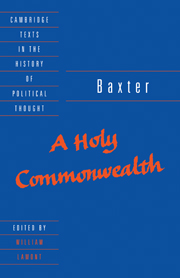Book contents
- Frontmatter
- Contents
- Preface
- Introduction
- Richard Baxter: a chronology
- Further reading
- Biographical notes
- A Holy Commonwealth
- Preface
- An Addition to the Preface
- Adam Contzen the Jesuites Directions
- 1 There is a God that is mans Creator
- 2 God is the Soveraign Ruler of Mankind
- 3 Of the Constitution of Gods Kingdome
- 4 Of the Administration of the Universal Kingdom
- 5 Of a subordinate Commonwealth in General
- 6 Of the several sorts of Commonwealths
- 7 Of the Foundation efficient and conveying causes of Power
- 8 Of the best form of Government, and Happyest Common-wealth
- 9 How a Commonwealth may be reduced to this Theocratical temper, if it have advantages, and the Rulers and People are willing
- 10 Of the Soveraigns Power over the Pastors of the Church, and of the difference of their Offices
- 11 Of the Soveraigns Prerogatives, and Power of Governing by Laws and Judgement
- 12 Of due Obedience to Rulers, and of Resistance
- 13 Of the late Warres Meditations
- Appendix: Preface to The Life of Faith (1670)
- Index
- Title in the Series
6 - Of the several sorts of Commonwealths
Published online by Cambridge University Press: 05 June 2012
- Frontmatter
- Contents
- Preface
- Introduction
- Richard Baxter: a chronology
- Further reading
- Biographical notes
- A Holy Commonwealth
- Preface
- An Addition to the Preface
- Adam Contzen the Jesuites Directions
- 1 There is a God that is mans Creator
- 2 God is the Soveraign Ruler of Mankind
- 3 Of the Constitution of Gods Kingdome
- 4 Of the Administration of the Universal Kingdom
- 5 Of a subordinate Commonwealth in General
- 6 Of the several sorts of Commonwealths
- 7 Of the Foundation efficient and conveying causes of Power
- 8 Of the best form of Government, and Happyest Common-wealth
- 9 How a Commonwealth may be reduced to this Theocratical temper, if it have advantages, and the Rulers and People are willing
- 10 Of the Soveraigns Power over the Pastors of the Church, and of the difference of their Offices
- 11 Of the Soveraigns Prerogatives, and Power of Governing by Laws and Judgement
- 12 Of due Obedience to Rulers, and of Resistance
- 13 Of the late Warres Meditations
- Appendix: Preface to The Life of Faith (1670)
- Index
- Title in the Series
Summary
Having spoken of the Universal Kingdom, and next in general of particular subordinate Common-wealths, that God hath by institution made the parts of it; I must First speak of the CONSTITUTION, and next of the ADMINISTRATION of these. And about the Constitution I shall first speak of the MODES (or SPECIES as commonly called) and then of the Individuation.
Thes. 65. God hath not in his Universal Lawes restrained the Nations of the world to any one Mode or Species of Government, but left it as a variable thing to be determined according to the condition of each people, whether one or many shall have the Soveraignty under him.
There is a twofold diversity of Governments: One is in the Persons Ruling; Another is in the Matter of Government: whether the former do deserve the name of Specification or not, it hath by Custome obtained that name: And so Monarchy; Aristocracie, and Democracie are called the distinct Species of Governments or Common-wealths. In the Matter of Government there is difference, in that some have greater power, and some have less: some Soveraigns are limited to certain things, and degrees of power; and some are unlimited: and some limited more, and some less. And one would think this difference were as great as the former.
I know some pretend to a Divine Institution for Monarchy, but they mean onely that it may from Scripture be proved to be best; but not that no other but it, is Lawfull.
- Type
- Chapter
- Information
- Baxter: A Holy Commonwealth , pp. 76 - 92Publisher: Cambridge University PressPrint publication year: 1994



